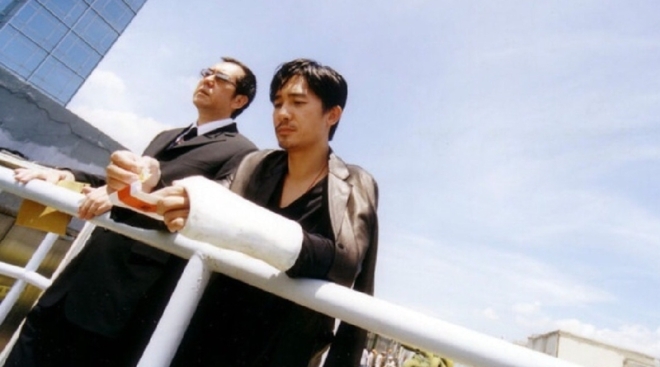Infernal Affairs <無間道> celebrates its 20th anniversary this month. This is the movie that reunites Andy Lau and Tony Leung Chiu-Wai since their last collaboration in The Tigers <五虎將之決裂> back in 1991. And most of all, it famously re-defined the oft-told undercover genre by giving it a then-fresh twist.
That twist in question involves a triad leader (Eric Tsang’s Hon Sam) planting a mole (Edison Chen and Andy Lau playing the younger and older Lau Kin-Ming respectively) in the police department. But Hon Sam himself doesn’t know that one of his right-hand men, Chan Wing-Yan (Shawn Yue and Tony Leung Chiu-Wai in their respectively younger and older roles) is actually a police officer, who has been working undercover in his triad organisation for many years. Only two of his superior officers have a record of his true identity and one of them includes Superintendent Wong (Anthony Wong).
Infernal Affairs <無間道> focuses more on the cerebral thrills of a cat-and-mouse game between the two moles as well as Hon Sam and Superintendent Wong, which in turn, is a refreshing change of pace from the typically action-oriented undercover thriller. Alan Mak and Felix Chong’s screenplay is akin to an elaborate chess game as we see how the men from both sides of the law try to outsmart each other.

With the exception of somewhat bland subplots involving Lau’s fiancee, Mary (Sammi Cheng) and Chan’s psychiatrist Dr Lee Sum-Yee (Kelly Chen) and not to forget, a patchy and jarring inclusion of Elva Hsiao’s cameo appearance as Chan’s ex-girlfriend, it was otherwise a mostly well-written storyline, proving that mainstream Hong Kong cinema is not all about star power and action set pieces.
Having revisited Infernal Affairs <無間道> a week ago prior to writing the retrospective review, I remember how I used to find this film particularly overrated when I first saw it back in 2002. It only took me a couple of revisits that I started to appreciate the film more than ever. The mole-within-the-police-department concept is refreshingly novel and it was this uniqueness that breaks away from the standard mould of a Hong Kong undercover genre from the likes of Man on the Brink <邊緣人> (1981) and City on Fire <龍虎風雲> (1987). The main story is taut and suspenseful while Andrew Lau has a flair for thrilling battle-of-wits set pieces, particularly during Hon Sam’s drug deal with the Thais led by Paul (Chaucharew Wichai).
The movie also benefits from Andrew Lau and Lai Yiu-Fai’s atmospheric cinematography and Chan Kwong-Wing’s memorable score. Then, there’s the superb ensemble cast. Andy Lau and Tony Leung Chiu-Wai deliver among their best performances to date, even though I personally prefer the latter the most for his coolly charismatic and at times, sombre turn as Chan Wing-Yan. Either way, it’s nice to see the two of them share the same screen, notably when they enjoy the sound of Tsai Chin’s “Forgotten Times” in a hi-fi audio shop and again, the iconic rooftop scene.

Interestingly enough, the aforementioned latter scene was originally supposed to end up with a fight scene between Lau Kin-Ming and Chan Wing-Yan. But it was Andy Lau who suggested a change to a verbal showdown — a result that makes the climactic third act all the more impactful. Certain scenes were improvised as well and among the notable ones include Eric Tsang’s Hon Sam refused to shake hands with Anthony Wong’s Superintendent Wong during the interrogation scene, saying: “Have you ever seen a person go to a funeral parlour and shake hands with a dead body?“
Here’s another interesting trivia worth mentioning here. Alan Mak’s original script treatment only involved a police officer going undercover in the triad organisation. But Andrew Lau’s subsequently added inputs along with Felix Chong’s revised script include the story of a triad leader placing a mole in the police department. The idea of introducing two moles on both sides of the law even had Alan Mak use John Woo’s Face/Off (1997) as his major source of inspiration. But instead of including that movie’s far-fetched concept of a facial transplant surgery scene, the story retains its grounded realism by depicting the psychological elements of identity switch.
Despite having such a novel script, the journey of bringing Infernal Affairs <無間道> to fruition wasn’t smooth-sailing at first, especially since the movie required more than HK$20 million to make. It was considered a risky gamble at the time of the once-thriving Hong Kong film industry suffering a downward spiral. But the eventual studio, Media Asia Film Company Limited finally granted the budget and the rest, as they say, is history. The investment paid off well enough, where Infernal Affairs <無間道>‘s box-office performance exceeded expectations and became the top-grossing Hong Kong film during that year with a whopping HK$55.1 million.
The success of Infernal Affairs <無間道> prompted two immediate follow-ups including a prequel and a sequel in the following year. And for better or worse, it sets the trend of Infernal Affairs <無間道>-type movies and series over the next few years to the point such a story is milked dry. The movie even scored 16 Hong Kong Film Awards nominations and took home seven wins including Best Film, Best Director, Best Actor (Tony Leung Chiu-Wai), Best Supporting Actor (Anthony Wong) and Best Screenplay.


